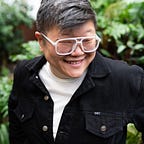The Surprising Hostility Of Kindness
Everyone’s had a moment where you insisted on something, and a person tries to decline.
At a birthday party, there’s plenty of cake. You’re cutting the slices and see someone without. “Have some cake,” you suggest cheerfully. “Oh, I can’t.” “Please, I insist,” you dutifully persist. This conversation carries on for a few minutes till the person finally accepts the cake. This is generosity in response to the possibility that someone doesn’t want to transgress your kindness.
There’s just one problem: you don’t know why they’re saying no.
When we think of discrimination against disability, we’re not thinking of the times we’re being nice and pressuring someone into accepting our niceties.
Now manage your heart
These days, my diet is pretty strict. I was sick for two weeks and tested negative for COVID twice. My doctor still thinks I had COVID based on the progression of my symptoms and the lasting heart problems I’ve had now for a month. My once healthy blood pressure is now firmly high, and there’s protein in my urine. We thought I needed a cardiologist after reading 200/150 at home, but the doctor talked about a nephrologist. For the first month of my new life with heart concerns, I’ll be dieting like an obese elder staying at the Mayo Clinic. I’m armed with new meds and a treadmill. I’m not allowed to run because it might induce a stroke, but I need to exercise, so my doctor wants me to walk on inclines and strictly monitor my heart rate. “Nothing over 110,” she emphasizes.
For all the talk about a 99% survival rate, I wish the dipshits who won’t perform the most basic preventative measures understood that (conservative estimates) 10% of survivors end up disabled with lifelong symptoms regardless of age or vulnerabilities. 10% may not sound like a lot, so for comparison, only 5% of the population identifies as LGBTQIA. One study at the University of Washington believes 30% of COVID survivors end up with chronic illness.
Honestly, of all the things that could’ve happened, this really isn’t too bad. There are some pretty gnarly long-term and chronic illnesses coming out of COVID survival.
Here’s the thing: it’s a really long explainer. It’s also incredibly personal, and I would prefer not to share it every time I have to say no to something. As an adult, I’m hoping I don’t have to justify any of my decisions, but I understand that we want to know why as humans. It seems so benign, almost petty, right? The kindness of others shouldn’t be perceived as annoying — unless you’re a dick.
As people ramp up the ways they can be supportive, I find myself repeatedly saying no. A coworker just offered to deliver me Girl Scout cookies. It wasn’t the distance. It’s the cookies. I can’t eat the cookies. Believe me, and I want to eat the cookies. No, please don’t give me a gift card for DoorDash. No, I can’t go running with you. No, I don’t think you can teach me how to do interval training.
I love the support, and I hate that I have to say no multiple times and feel like a dick about it.
I think back to a lot of different experiences
How many times have I been in an elevator, and someone complains about someone else using the elevator for one or two floors? A friend with cancer gets verbally assaulted by someone for using an accessible parking spot for “faking a handicap” outside an oncology clinic. There was the time at AlterConf that someone gave an entire talk about how having to decline food at the office is hellish because of their own health and disabilities.
I think back to a previous job. I wrote an email to my team that I couldn’t work because my girlfriend was sick. During my performance review, it was brought up, “Her girlfriend is an adult. Why can’t she take care of herself?” My manager knew I was taking her to the hospital, and there was no reason I had to be that explicit with my coworkers. I can’t imagine that office’s hostility now that I’m perpetually fatigued and my heart could stop if I do anything “too stressful.”
Our culture is so ableist. It’s baked into our kindness. We never consider that someone might be saying no for a health reason. We resent others for putting their health first, even when there’s no negative impact on us.
Thanks to COVID, we’re going to see a lot more people with invisible disabilities, and it would be great if, as a culture, we learned to be better.
Oh, and no more Twitter for me, at least till my heart is given the clear.
